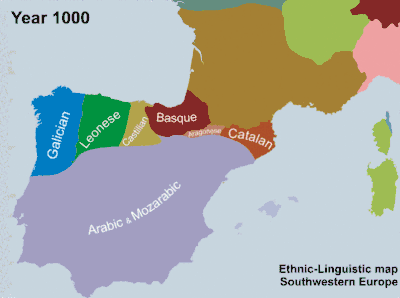Language policies of Francoist Spain
Language politics in Francoist Spain centered on attempts in Spain under Franco to increase the dominance of the Spanish language (Castilian) over the other languages of Spain. The regime of Francisco Franco had Spanish nationalism as one of its bases.[1] Under his dictatorship, the Spanish language (known in some parts of Spain as castellano, i.e., Castilian) was declared Spain's only official language.
The use of other languages in the administration was either banned,[2] discouraged or frowned upon depending on the particular circumstances and timing, while the use of non-Castilian names for newborns was forbidden in 1938, except for foreigners.[3]
The situation evolved from the harshest years of the immediate afterwar (especially the 1940s, also the 1950s) to the relative tolerance of the last years (late 1960s and early 1970s); Franco died in 1975, and his successor Juan Carlos of Spain began the Spanish transition to democracy.
Previous situation
For the first time in the history of Spain, the Second Republic recognised Galician, Basque, and Catalan as official languages when it granted autonomy for some regions with a regional language.
The Spanish language

As part of the nationalistic efforts:
- Spanish films were produced only in Spanish. All foreign films were required to be dubbed, and all films originally produced in the languages of autonomous communities were required to be re-issued in Spanish.
- Spanish names and Spanish versions of Catholic and classical names were the only ones allowed. Leftist names like Lenín and regional names like even the Catalan Jordi (after Catalonia's patron saint, Saint George) were forbidden and even forcibly replaced in official records. Only Christian names in Spanish were allowed in official documents.
In the first decade of Franco's rule, languages other than Castilian were "confined to private spaces".[1]
In the regime's most radical discourse, languages other than Spanish were often considered "dialects" in the sense of speeches that were not developed enough to be "real languages". Basque was different enough that it could not be taken as a debased form of Spanish but was despised as a rural language of limited currency, unfit for modern discourse.[4] This never happened at the academic level, though.
All these policies became less strict and more permissive as time passed.
Evolution
The Press Law of Manuel Fraga Iribarne replaced the pre-publication censorship with after-the-fact punishments.
Situation by areas
Most notably, several sporting organizations—including FC Barcelona and Athletic Bilbao, among others—were forced to change their names from the local language to Spanish. In fact, Atlético Madrid, itself with roots in Athletic Bilbao, received its current name as a result of Franco's language policies, in 1941.
Andalucia
Aragon
Asturias
Balearic Islands
Basque Country
- Basque language
- The Catholic Church had supported the Basque nationalists aligned with the Republic.
- Creation of Standard Basque by Euskaltzaindia
- Unofficial Basque-language schools (ikastola).
Catalonia
- Catalan language
- Salvador Espriu
- Joan Manuel Serrat was not allowed to sing La La La in Catalan for the Eurovision Song Contest 1968 since the contest forbid to sing in non-official languages from 1966 to 1973 and, unwilling to sing it in Spanish, was replaced by Massiel, who won the contest.
Galicia
- Galician language
- The exiles and emigrants in Buenos Aires took a great role in Galician literature.
- The nationalist resistance in Spain in partnership with the exiled abroad denounce the repression, censorship and veto of the Francoist regime about public use and printing in Galician language (for example, forbidding the publishing a translation of Martin Heidegger) and other Spanish languages. The protest was taken before the VIII UNESCO Conference at Montevideo in 1954 (when Spain was about to be admitted, and where the Montevideo Resolution was taken), with a 32-page text called Denuncia da perseguizón do idioma galego pol-o Estado Hespañol ("Denounce of the persecution against the Galician language by the Spanish State"), written by Ramón Piñeiro López and distributed to the audience in Galician, English and French.[5] The action was discussed in the book A batalla de Montevideo ("The Montevideo battle") by Alonso Montero[6] and reactivated in claims in the present day.[7]
León
Spanish Guinea
Navarre
CA Osasuna was allowed to maintain its Basque name, unlike other football teams with non-Spanish names.
Spanish North Africa
- Ceuta, Melilla, Spanish Morocco, Spanish Sahara, international Tangier
Valencian Community
References
- Sebastian Balfour, "Spain from 1931 to the Present", in Spain: a History, edited by Raymond Carr. Oxford : Oxford University Press, 2000. ISBN 0198206194. (p. 266).
- The use of Catalan was banned for the on-duty functionaries of the province of Barcelona in 1940. Cf. Mariño Paz, Ramón (1998). Historia da lingua galega (2. ed.). Santiago de Compostela: Sotelo Blanco. p. 353. ISBN 84-7824-333-X.
- "disposición do Boletín Oficial del Estado do 18 de maio pola que, advertindo que 'La España de Franco no puede tolerar AGRESIONES CONTRA LA UNIDAD DE SU IDIOMA, ni la intromisión de nombres que pugnan con su nueva constitución política (...) tratándose de españoles, los nombres deberán consignarse en castellano.'"Mariño Paz, Ramón (1998). Historia da lingua galega (2. ed.). Santiago de Compostela: Sotelo Blanco. p. 353. ISBN 84-7824-333-X.
- Colin Baker, Sylvia Prys Jones, Encyclopedia of Bilingualism and Bilingual Education, (1998), Multilingual Matters (pp. 285-6).
- (in Galician)
"Archived copy". Archived from the original on 15 August 2016. Retrieved 20 June 2016.CS1 maint: archived copy as title (link) (in Galician) - "Archived copy". Archived from the original on 15 August 2016. Retrieved 20 June 2016.CS1 maint: archived copy as title (link) (in Galician)
- (in Galician)
External links
- Cronologia de la repressió de la llengua i la cultura catalanes ("Chronology of the repression of Catalan language and culture", in Catalan with Spanish quotations).
- Ministerio de la Gobernación (Gazeta of 17 May 1940) (CCITT T.& G4 Facsimile TIFF). Order of 16 May 1940 forbidding the use of generic foreign terms in lettering, samples, advertisements, etc.